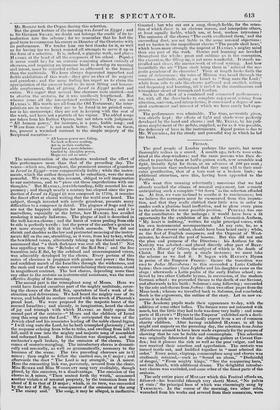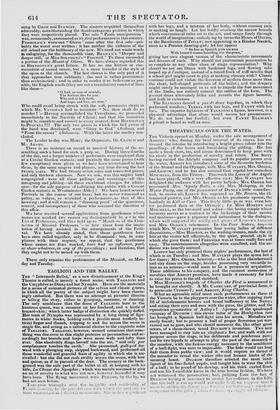FRIDAY.
The good people of London perhaps like music, but never thoroughly unless in a crowd. A month ago, tickets were exhi- bited at the shop-windows; and the same persons who then de- clined to purchase them at half-a-guinea each, new scramble and fight, literally fight for them, at an advance of 200 per cent.; simply because they understand that they may aid to their auri- cular gratification, that of a torn coat or a broken limb ; no additional attraction, save this, having been appended to the Festival.
We went this morning reluctantly ; conscious that we had already reached the climax of musical enjoyment, but scarcely anticipating such a complete "let down " as the selection aftbrded us. At first, we were inclined to ascribe it to carelessness; but we believe the managers must be exonerated from this imputa- tion, and that they really clubbed their little wits in order to render such a glorious band ineffiTtive, and to place every piece in the scheme in the worst possible position. PURCELL was one of the contributors to the melange : it would have been a fit opportunity for the ,exhibition of his noble Coronation Anthem, " My heart is inditing," written for eight principal voices, with his own instrumental accompaniment. At any rate, he, as a writer of the severer school, should have been heard early; while, as the first of English composers, and the Organist of West- minster, he deserved the post of honour. But this did not suit the plan and purpose of the Directors; his Anthem for the- Nativity was selected—and placed directly after part of BEET- HOVEN'S Mount of' Olives, the subject of which is the death of Christ. But this is only a single instance; we must take the scheme as we find it. It began with HAYDN'S Hymn in praise of the Emperor Francis: thence the transition was easy to Judas Maccaberus: to this succeeded a Latin Catholic hymn; then another : then Jeplitha and his daughter came on the stage : afterwards a Latin psalm of the early Italian school ; re- lieved by two other Catholic hymns, in succession, of the modern German school : we proceeded thence to the death of our Saviour, and afterwards to his birth; Solomon's song following; succeeded by the solo and chorus from Joshua : then two other ,pages from the Mass-book; whence we travelled back to Solomon, and concluded. Such is the argomento, the outline of the story. Let us now ex- amine it in detail.
The Academy pupils made their appearance to-day, with the addition of some other ladies. The former were not intrusted with much, but the little they had to do was done very badly : and some parts of HAYDN'S "Hymn to the Emperor" exhibited such a decli- nation in pitch as we should hardly expect from a set of common charity children. After having exhibited HANDEL ill all his might and majesty on the preceding day, the selection from Judas Maccabcrus seemed to have been made expressly for the purpose of showing that he can be feeble and commonplace. This selection was originally fabricated for the shilling-gallery at Covent Gar- den; but it pleases the rich as well as the poor vulgar, and has now received their sanction and approbation. The oratorio was turned inside out, and huddled together in "most admired dis- order." Every noisy, claptrap, commonplace song and chorus was studiously retained,—such as "Sound an alarm," "Disdainful of danger," "From mighty kings," "See the conquering hero," and the March, with additional drums. The delightful introduc- tory chorus was excluded, and some other of the finest parts of the oratorio.
The only entire piece of MOZART which this Festival affords us, followed—his beautiful (though very short) Motet, "Ne pulvis et cinis ;" the principal bass of which was charmingly sung by TAMBURINI. In the course of the morning, two other solos, wrenched from his works and severed from their connexion, were siting by GRISI and IVANOFF. The singers acquitted themselves admirably, notwithstanding the disadvantageous position in which they were respectively placed. The solo "Penis omnipotentia " was, erroneously, announced as its first performance in this country. PERGOLESI'S worn-out "Gloria" came after the first solo—pro- bably the worst over written : it has neither the richness of the old school nor the brilliancy of the new. We need not waste words al eulogizing, for the thousandth time, BRAHAM'S "Deeper and deeper still," or Miss STEPHENS'S "Farewell." To these succeeded a portion of the Mount of Oliver. We have always regarded this as BEETHOVEN'S great failure. It has no one feature or cha- racteristic of sacred music, but is a mere transfer of' the style of the opera to the church. The last chorus is the only part of it that approaches true sublimity : the rest is rather pantomimic than ecclesiastical : and in order to render it as ludicrous as pos- sible, the English words (they are not a translation) consist of lines like these-
" 0 hail, ve sons of mortals,
The Saviour diem for you: Ito still in holy Nth,
And hope, and love, are true."
Who could avoid being struck with the soft, persuasive strain in which Mr. VAUGHAN had to insinuate " No, thou shalt do no murder !"--Having accomplished the Crucifixion, we proceeded immediately to the Nativity of Christ ; and that the transition might be comnlete and correct in every respect, from BEETHOVEN to PURCELL !!! The only two pieces in which the full power of the band was developed, were "Glory to God" (Joshua), and "From the censer" (Solomon). With the latter the medley con- cluded.
The Leader to-day was Mont ; the Organists, Dr. CROTCH and Mr. ADAMS.
There is no instance on record in musical history, of the as- sembling such a band for such a purl). se. During three-fourths of the day, not a larger number of wile-triers were employed than at a Covent Garden oratorio; and precisely the same pieces (with few exceptions) were given as we have been accustomed to hear there, by the same singers and players, any time during the last twenty years. We had twenty-seven solos and concerted pieces, and only thirteen choruses. Now we ask, was this mighty band congiegated— were all these puflings and vauntings—all this intriguing and jobbing—all these exorbitant charges for admis- sion—for the sole purpose of indulging the public with a Covent Garden oratorio in Westminster Abbey ? We have heard several Festivals in the course of our lives; but we never witnessed so paltry, so vulgar, so wretched a performance, as that of this morning; and it will remain a " damning proof " of the ignorance, conceit, and incompetency of those who assumed the direction of this affair.
We have received several- applications from gentlemen whose names are marked (we cannot say distinguished) by a in the List of Performers, and thus held up as " Metnh..rs of the Com- mittee of Musical Professors"— to free them from the impu- tation of having assisted in the arrangements of the Festi- val. We have already stated, that these gentlemen have been once called together, only to be dismissed : but, in com- pliance with their request, we repeat, that the gentlemen whose names are thus marked, have had no ihiluence, part, or share whatever,in any of the procedings ; and therefore, that they ought not to be mixed up with them. -























 Previous page
Previous page